13 Best Herbal Tinctures For Eczema

Herbal tinctures for Eczema are concentrated liquid extracts made from various herbs and plants, which are used to treat and manage the symptoms of eczema, a chronic skin condition characterized by inflammation and skin irritation.
These herbal remedies have gained popularity due to their potential benefits, including reducing inflammation, soothing skin irritations, and promoting skin healing.
Examples of herbal tinctures that have been used to treat eczema include Aloe vera, which is known for its anti-inflammatory and moisturizing properties; Chamomile, which has anti-inflammatory and soothing effects; Calendula, which promotes skin healing and reduces inflammation; Echinacea, which boosts the immune system and reduces inflammation; and Lavender, which has anti-inflammatory and calming effects.
By using these herbal tinctures, individuals with eczema may be able to alleviate their symptoms, reduce their reliance on conventional medications, and promote overall skin health.
According to "Journal of natural products", tinctures for eczema may be effective in treating the condition, as a 95% ethanol extract of Lupinus termis seeds was shown to be comparable in efficacy to a corticoid therapy in a double-blind clinical trial.
Below there's a list of the 13 best herbal tinctures for eczema.
- 1. Aloe vera tinctures
- 2. Calendula officinalis tinctures
- 3. Avena sativa tinctures
- 4. Cinchona officinalis tinctures
- 5. Ginkgo biloba tinctures
- 6. Taraxacum officinale tinctures
- 7. Urtica dioica tinctures
- 8. Silybum marianum tinctures
- 9. Artemisia vulgaris tinctures
- 10. Rhus toxicodendron tinctures
- 11. Hypericum perforatum tinctures
- 12. Camellia sinensis tinctures
- 13. Rosmarinus officinalis tinctures
Also you may be interested in...
TODAY'S FREE BOUNDLE
Herb Drying Checklist + Herbal Tea Shopping List + Medicinal Herbs Flashcards
Enter you best email address below to receive this bundle (3 product valued $19.95) for FREE + exclusive access to The Aphotecary Letter.
$19.95 -> $0.00
1. Aloe vera tinctures
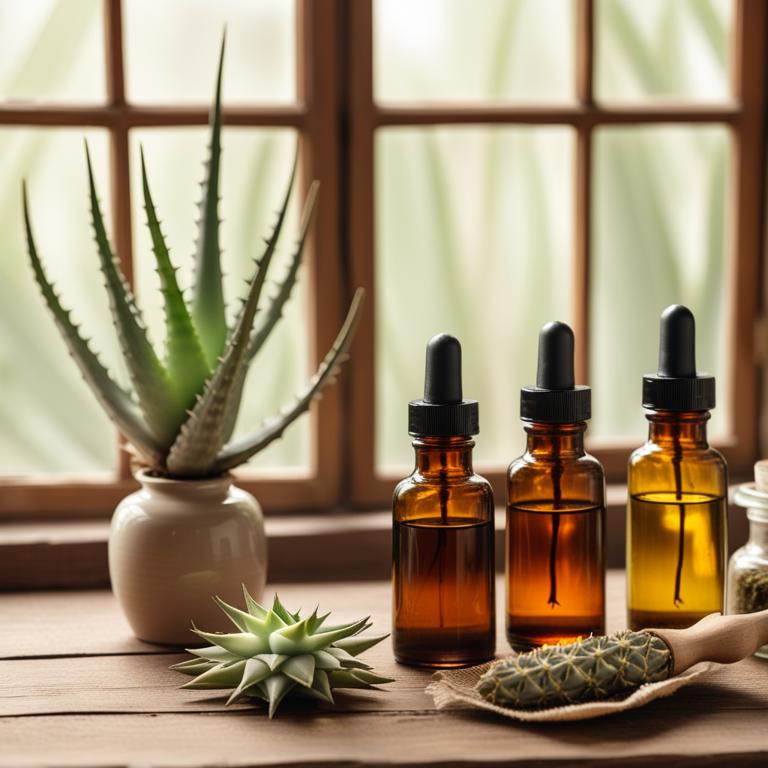
Aloe vera tinctures have been widely used to treat eczema due to their anti-inflammatory, antiseptic, and moisturizing properties, which help soothe and calm irritated skin.
The bioactive constituents of aloe vera, such as aloin, aloe-emodin, and acemannan, have been shown to possess potent anti-inflammatory and immunomodulatory effects that help reduce redness, itching, and swelling associated with eczema.
By promoting skin hydration and protecting against environmental stressors, aloe vera tinctures help to create a healthy barrier function, reducing the frequency and severity of eczema flare-ups.
The benefits of using aloe vera tinctures to treat eczema include reduced inflammation, improved skin elasticity, and enhanced wound healing, making it a popular natural remedy for managing this common skin condition.
Related Study
According to "Infectious disorders drug targets", Aloe vera tinctures for eczema is one of the many therapeutically active natural herbal resources that are potent and safe in the treatment of dermatological infections, including skin ailments such as eczema.
2. Calendula officinalis tinctures
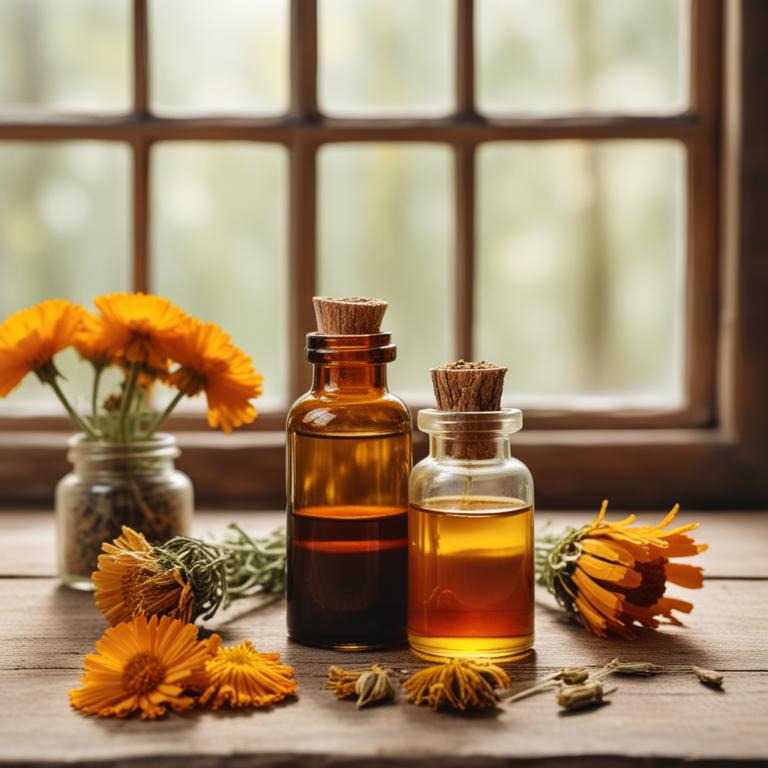
Calendula officinalis tinctures have been traditionally used to treat eczema due to their anti-inflammatory and antimicrobial properties, which help to soothe and calm the skin.
The tinctures work by reducing redness and swelling associated with eczema, promoting wound healing, and fighting off infections that can exacerbate the condition.
The bioactive constituents of Calendula officinalis, including triterpenoids, flavonoids, and carotenoids, contribute to its therapeutic effects, with triterpenoids being particularly noted for their anti-inflammatory and antimicrobial activities.
Regular use of Calendula officinalis tinctures has been found to provide relief from eczema symptoms, reduce the frequency and severity of flare-ups, and promote overall skin health.
Related Study
According to "Forschende Komplementarmedizin", Calendula officinalis tinctures for eczema may be of value in selected dermatological indications, although further controlled clinical efficacy studies and pharmacological studies are needed to confirm their assumed effects.
3. Avena sativa tinctures
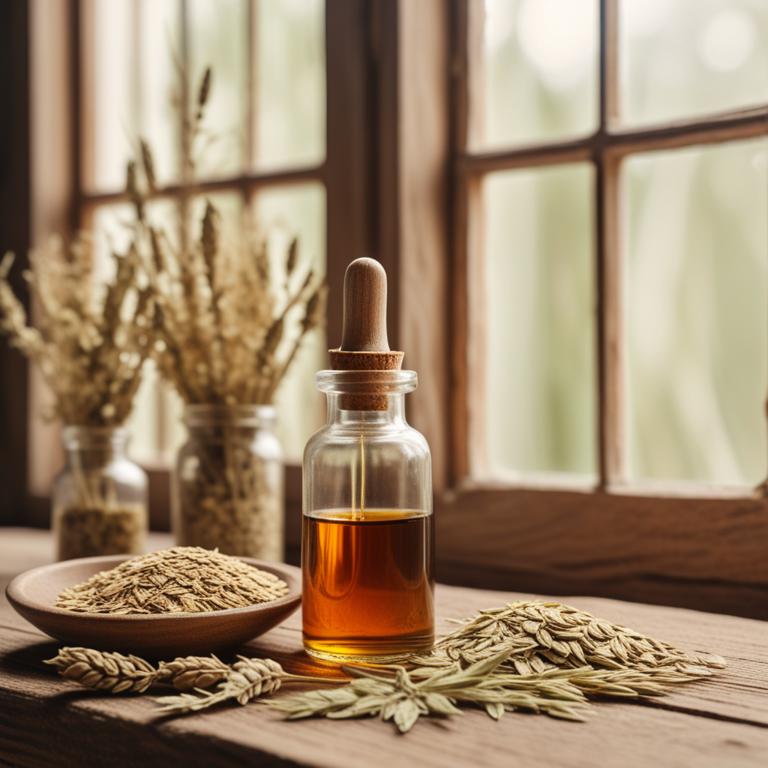
Avena sativa tinctures have been used to treat eczema due to their anti-inflammatory, antipruritic, and soothing properties.
These tinctures help to calm and soothe irritated skin, reducing redness and itching associated with eczema.
The bioactive constituents of Avena sativa, such as avenanthramides and avenacosides, possess potent antioxidant and anti-inflammatory activities that contribute to its therapeutic effects.
The benefits of using Avena sativa tinctures for eczema treatment include reduced inflammation, improved skin hydration, and enhanced skin barrier function, leading to a more comfortable and manageable condition.
4. Cinchona officinalis tinctures

Cinchona officinalis tinctures have been traditionally used to treat eczema due to their anti-inflammatory and antioxidant properties.
The tannins and alkaloids present in this herbal preparation help to soothe and calm the skin, reducing redness and itching associated with eczema.
The bioactive constituents, including quinine and cinchonine, exhibit anti-inflammatory and antipruritic effects, which help to alleviate the symptoms of eczema.
Regular use of Cinchona officinalis tinctures may help to reduce the frequency and severity of eczema outbreaks, promoting healthy and clear skin.
5. Ginkgo biloba tinctures

Ginkgo biloba tinctures are a popular herbal preparation used to treat eczema, a chronic skin condition characterized by inflammation and skin irritation.
The anti-inflammatory and antioxidant properties of Ginkgo biloba tinctures help to reduce redness and itching associated with eczema, while also promoting skin healing and regeneration.
The bioactive constituents of Ginkgo biloba, including flavonoids and terpenoids, have been shown to exhibit potent anti-inflammatory and antioxidant activities, which contribute to its therapeutic effects in treating eczema.
By using Ginkgo biloba tinctures, individuals with eczema can experience a range of benefits, including reduced symptoms, improved skin health, and enhanced overall well-being.
Related Study
According to "Drug development and industrial pharmacy", Ginkgo biloba tinctures for eczema may be beneficial as a cosmeceutical preparation that incorporates the antioxidant potential of Ginkgo biloba leaves to rejuvenate the skin, reduce wrinkles, and provide visible improvements in skin texture.
6. Taraxacum officinale tinctures
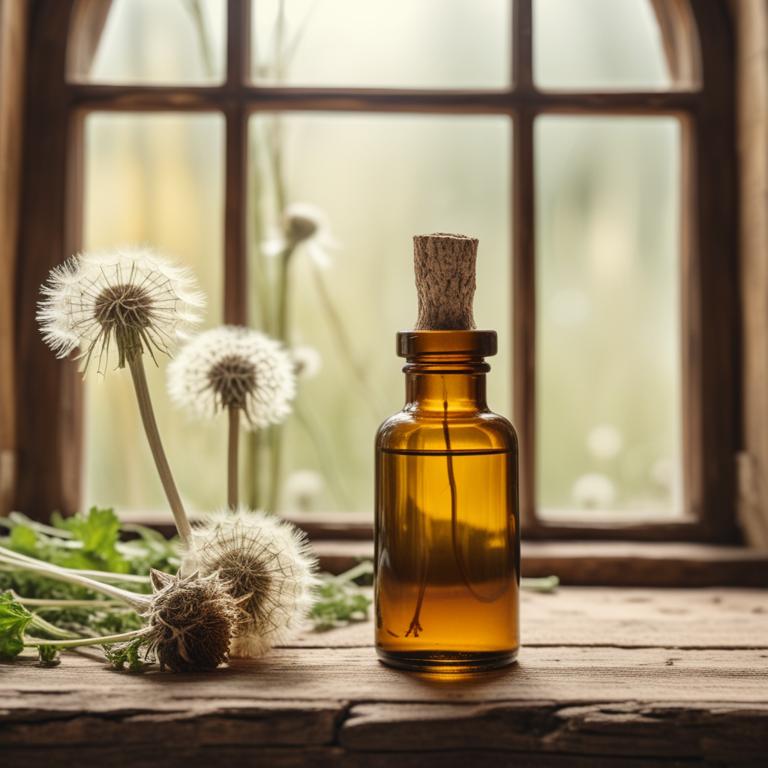
Taraxacum officinale tinctures have been traditionally used to treat eczema due to their anti-inflammatory, antiseptic, and soothing properties, which help to reduce redness, itching, and swelling associated with the condition.
The herbal preparation's bioactive constituents, such as flavonoids, phenolic acids, and sesquiterpenes, are responsible for its therapeutic effects, including its ability to modulate the immune system and reduce inflammation.
By promoting skin health and reducing the severity of eczema symptoms, Taraxacum officinale tinctures can provide relief and improve the quality of life for individuals suffering from this chronic condition.
The benefits of using Taraxacum officinale tinctures to treat eczema include reduced inflammation, improved skin barrier function, and a decrease in the frequency and severity of eczema flares.
7. Urtica dioica tinctures
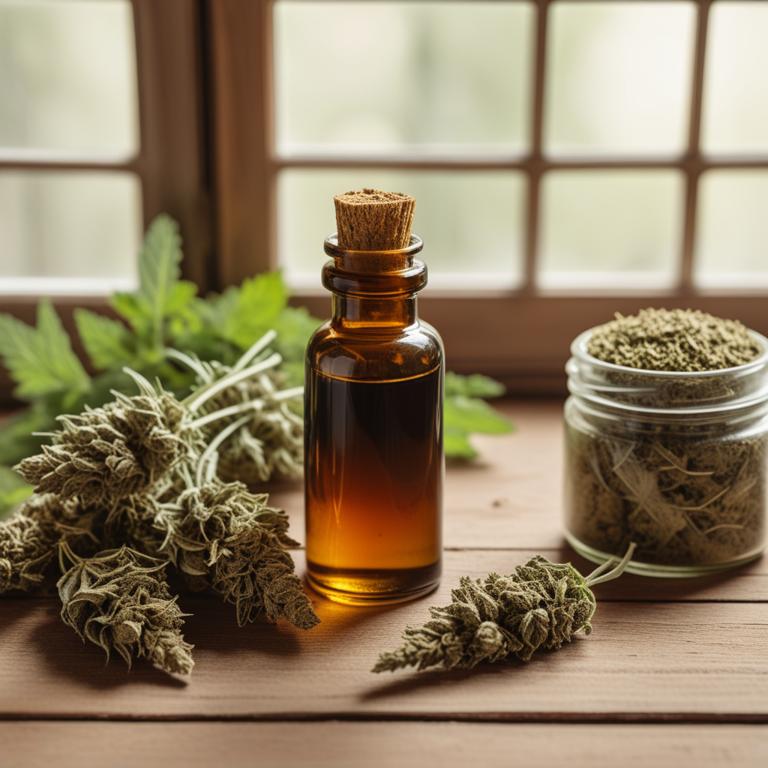
Urtica dioica tinctures have been traditionally used to treat eczema due to their anti-inflammatory, antihistamine, and soothing properties.
The herbal preparation helps to treat eczema by reducing redness, itching, and swelling, thereby providing relief to affected skin areas.
The bioactive constituents of Urtica dioica tinctures, including histamine, flavonoids, and alkaloids, contribute to their therapeutic effects by modulating the immune response and reducing inflammation.
Regular use of Urtica dioica tinctures may also help to improve skin health and reduce the frequency and severity of eczema symptoms.
8. Silybum marianum tinctures
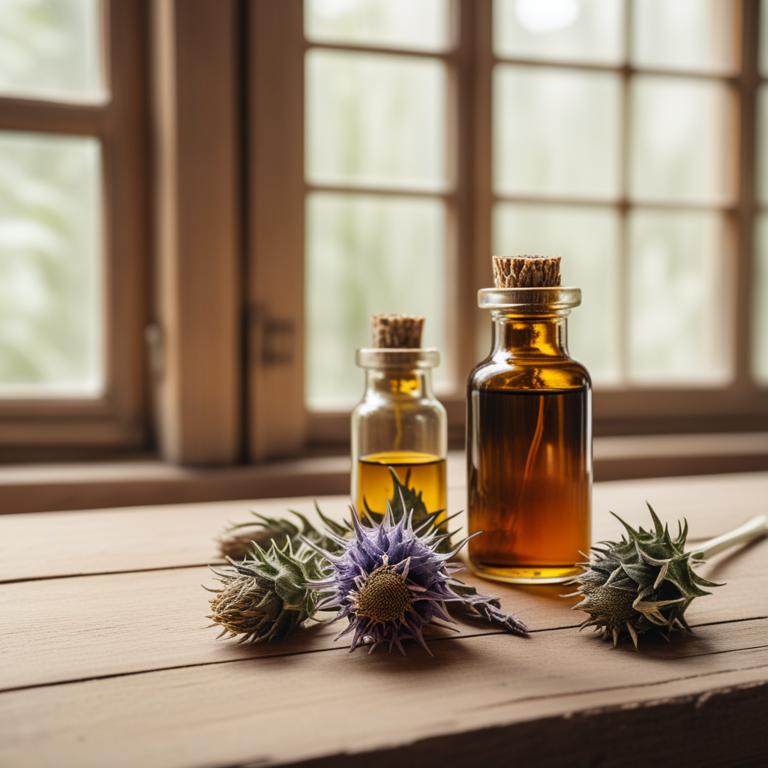
Silybum marianum tinctures, derived from the milk thistle plant, have been traditionally used to treat eczema due to its anti-inflammatory and antioxidant properties.
These properties help to soothe and calm irritated skin, reducing redness and itching associated with eczema.
The bioactive constituents present in Silybum marianum tinctures, such as silymarin, flavonoids, and polyphenols, are responsible for its therapeutic effects, which include reducing inflammation, protecting the skin from oxidative stress, and promoting skin healing.
The benefits of using Silybum marianum tinctures to treat eczema include reduced symptoms, improved skin health, and a decrease in the need for conventional medications.
9. Artemisia vulgaris tinctures

Artemisia vulgaris tinctures, derived from the leaves and flowers of the wormwood plant, have been traditionally used to treat eczema due to their anti-inflammatory, antimicrobial, and antiseptic properties.
These properties help to soothe and calm irritated skin, reducing redness and itching associated with eczema.
The bioactive constituents of Artemisia vulgaris, including flavonoids, phenolic acids, and essential oils, contribute to its therapeutic effects by modulating the immune response and reducing inflammation.
Regular use of Artemisia vulgaris tinctures can provide relief from eczema symptoms, promoting healthier and more balanced skin.
10. Rhus toxicodendron tinctures
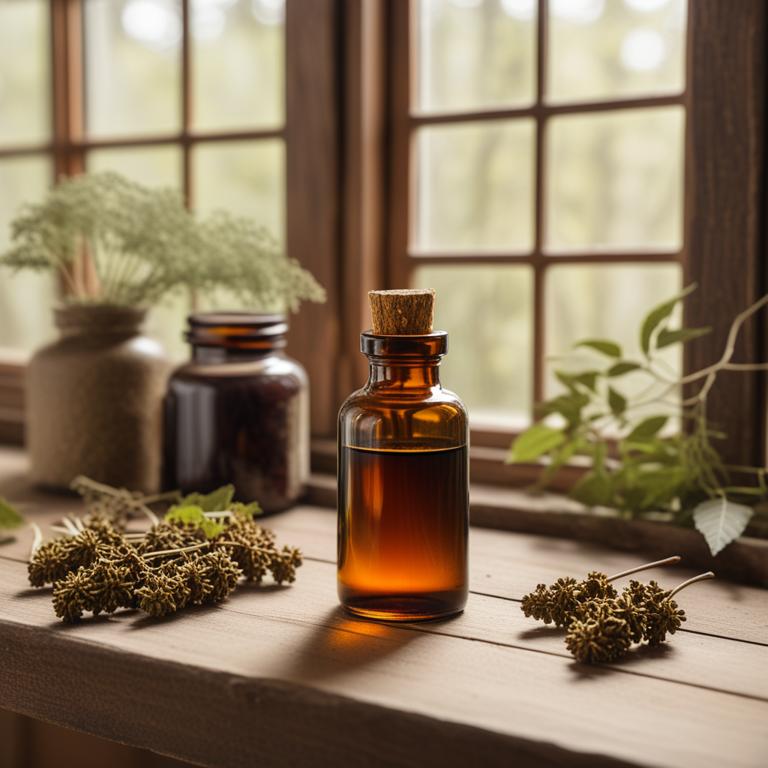
Rhus toxicodendron tinctures, derived from the sap of the poison ivy plant, have been used in homeopathy to treat eczema due to its anti-inflammatory and immunomodulatory properties.
The tincture helps to treat eczema by reducing the body's allergic response and promoting healing of the skin.
The bioactive constituents, including urushiol and other triterpenoids, have been found to have anti-inflammatory and antihistaminic effects, which help to soothe and calm irritated skin.
The benefits of using Rhus toxicodendron tinctures for eczema include reduced itching and inflammation, improved skin healing, and a decrease in the frequency and severity of eczema outbreaks.
11. Hypericum perforatum tinctures

Hypericum perforatum tinctures, also known as St. John's Wort, have been traditionally used to treat eczema due to their anti-inflammatory and antiseptic properties.
The bioactive constituents, including flavonoids, phenolic acids, and terpenoids, in these tinctures help to reduce inflammation, soothe skin irritations, and promote wound healing, ultimately alleviating eczema symptoms.
By reducing inflammation and promoting skin regeneration, Hypericum perforatum tinctures can help to calm itchy skin, reduce redness, and promote a smoother skin texture.
The benefits of using these tinctures to treat eczema include reduced symptoms, improved skin health, and a natural, non-pharmacological approach to managing this common skin condition.
Related Study
According to "BMC veterinary research", Hypericum perforatum tinctures have been shown to have antibacterial and antifungal effects, as well as wound-healing properties, making them a promising option for the treatment of skin diseases such as eczema in dogs.
12. Camellia sinensis tinctures
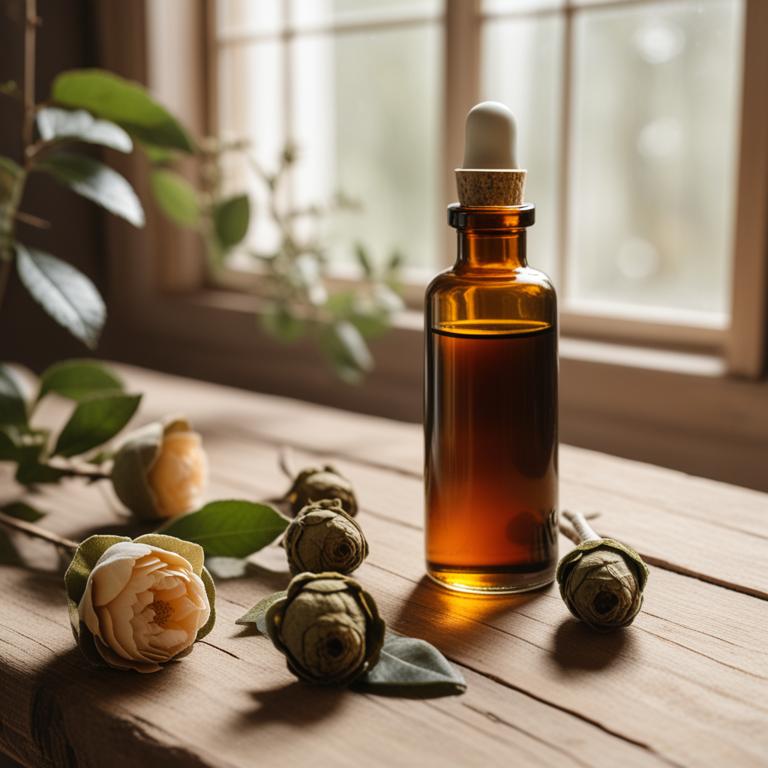
Camellia sinensis tinctures, derived from the leaves of the Camellia sinensis plant, have been used to treat eczema due to their anti-inflammatory and antioxidant properties.
The tannins and flavonoids present in this herbal preparation help to soothe and calm irritated skin, reducing redness and itching associated with eczema.
The bioactive constituents, including quercetin and catechins, have been shown to modulate the immune response and reduce inflammation, making it an effective natural remedy for eczema.
Regular use of Camellia sinensis tinctures has been reported to provide relief from eczema symptoms and promote overall skin health, making it a valuable addition to a treatment plan for individuals suffering from this condition.
13. Rosmarinus officinalis tinctures
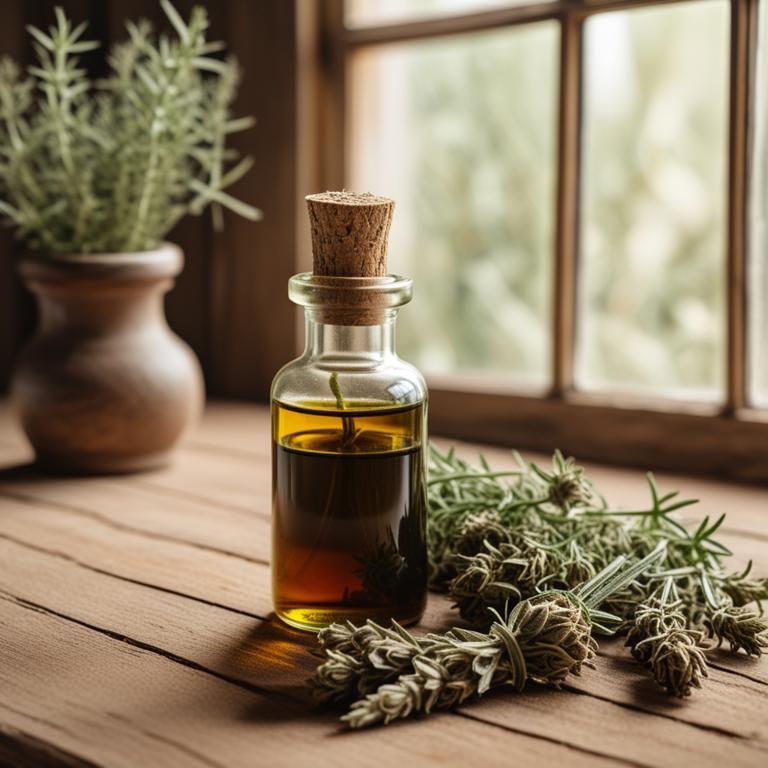
Rosmarinus officinalis tinctures have been traditionally used to treat eczema, a chronic skin condition characterized by inflammation and itching.
The anti-inflammatory and antioxidant properties of this herbal preparation help to reduce redness and irritation, promoting skin healing and soothing itchy skin.
The bioactive constituents, including rosmarinic acid, carnosic acid, and camphor, exhibit anti-inflammatory and antimicrobial activities that combat the underlying causes of eczema, such as oxidative stress and bacterial overgrowth.
By reducing inflammation and promoting skin health, Rosmarinus officinalis tinctures offer a natural and effective treatment option for eczema, providing relief from symptoms and improving overall skin well-being.
Related Study
According to "Natural product research", Rosmarinus officinalis tinctures, which contain a 1% concentration of the plant's extract, were found to be effective in treating Malassezia otitis externa in atopic dogs, suggesting potential benefits for eczema treatment.